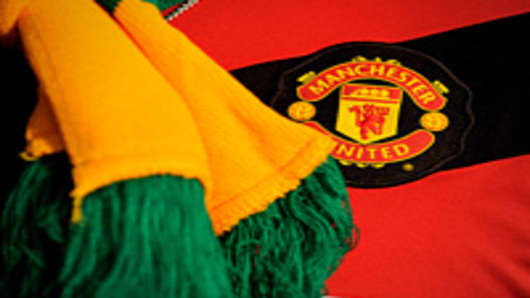It is not often that an established global brand comes to market. It's even rarer for that brand to be a professional sports franchise.
But if all continues on schedule, English soccer club Manchester United will price its IPO (explain this) on Thursday night and trade Friday on the NYSE.
Despite some warning signs from the club's balance sheet and ownership, the roadshow is scoring well in advance of the offering. Well, at least there are a lot of fans — sources tell CNBC that the presentation Monday in New York was full to capacity.
According to filings, the team will offer 16.7 million shares, priced between $16 and $20 per share. At the high end, the IPO will raise $330 million and value the team at $3.3 billion.
It's an appealing concept: Own a piece of the best-know pro sports team on the planet that has won 19 English league titles. But the question remains whether this will be an appealing investment.
When Malcolm Glazer bought the team in 2005 for $1.2 billion, it had no debt. Seven years later, the debt is approaching $700 million. Half of the funds from the IPO are expected to pay down debt, but the other half will go directly to the Glazer family.
On paper, it's been the type of leverage buyout that gets criticized in mainstream media: Load it up with debt, take some money out, and then put it back on the open market.
In addition, a dual-class share structure will allow the family to retain full control. That's part of the reason this icon of the United Kingdom is listing in the United States. The London Stock Exchange does not allow it, and initially, the listing actually was slated for Singapore — which does allow a dual-class structure. But last fall, market conditions were too volatile, and it was moved to the United States.
That, in and of itself, is not a reason to be pessimistic about a franchise that turns a profit every year and actually has a track record of being a solid equity investment. Manchester United averaged better than 20-percent annual appreciation in the 14 years it traded prior to the Glazer family taking it private seven years ago.
Ultimately, it's not even a lopsided stock-ownership dynamic that has some hedge fund managers hedging on this deal. It's the debt. Just servicing it has been a drag on the team's budget. In recent years, pressure to service Man-U's debt has sucked hundreds of millions out of team coffers that could have been used to improve the product on the field (er, pitch). Because of that, hundreds of thousands of fans are disappointed that more money isn't going toward buying decent players.
Performance on the field has become a concern. Last season was a disappointment, made doubly damaging because Manchester United lost the league title to cross-town rival Manchester City, which is owned by a uber wealthy group from Abu Dhabi.
If the team doesn't win, it makes less money.
And there is the rub for the fans. But even though the use of proceeds is a frustrating topic for the faithful, the team made a huge financial splash in early August, announcing a sponsorship dealwith General Motors that will bring in more than $550 million through 2021. The team is clearly trying to send the message that even though it's been around since the 19th century, growth is still in the franchise's future. In fact, the IPO roadshow states that Manchester United is only in the early stages of monetizing its supposed 659 million fans across the world.
Another issue surrounding the IPO is accountability. Because of a loophole for foreign companies, which is buried in the JOBS Act, Manchester United will not have to report results every quarter. The franchise also does not have to give forward-looking guidance.
Pretty sweet deal ... for ownership. But what about investors?
Who wants shares in a company saddled with debt where shareholders - even big ones - have no control?
Some will buy for the same reason people bought shares in the Green Bay Packers, a stock that is such a novelty that shares have no dividend and cannot be sold for a profit. There will be appetite from wealthy fans who love the team and want that cocktail party power of claiming ownership of the famed Red Devils.
But that doesn't mean they'll make any money off of it.
What's more, there is very little in the way of comparison because it is a rarity to get the chance to exclusively trade a professional team. In the U.S., you can buy MSG — you get the NBA's New York Knicks. But you also get the NHL Rangers, a WNBA team, an arena and a TV network. Sorry, no Jeremy Lin.
With a company like Liberty Media , the Atlanta Braves baseball team is just one component in a huge portfolio of companies. Also in baseball, Nintendo owns most of the Seattle Mariners, while Rogers Communications has a small piece of the Toronto Blue Jays.
All of these are indirect ways to own a sports team.
In terms of direct ownership, outside the U.S., there are a handful of soccer teams that actively trade. For example, AJAX trades in the Netherlands; Juventus in Italy; Benfica in Portugal. Fenerbache is a lesser-known name. It is listed in Turkey, but has an annualized return of almost 14 percent.
The other aforementioned teams all have had NEGATIVE annualized returns.
Those are losing investments, and it is yet to be determined which category will fit Manchester United.


